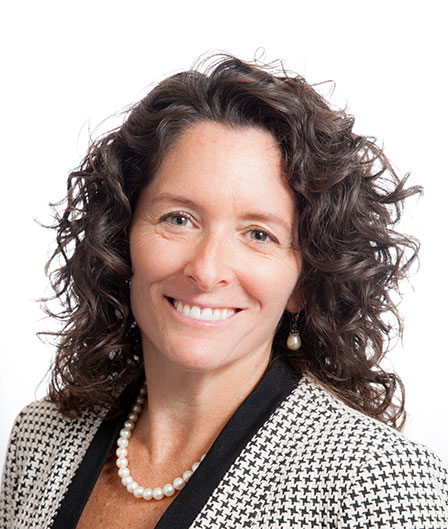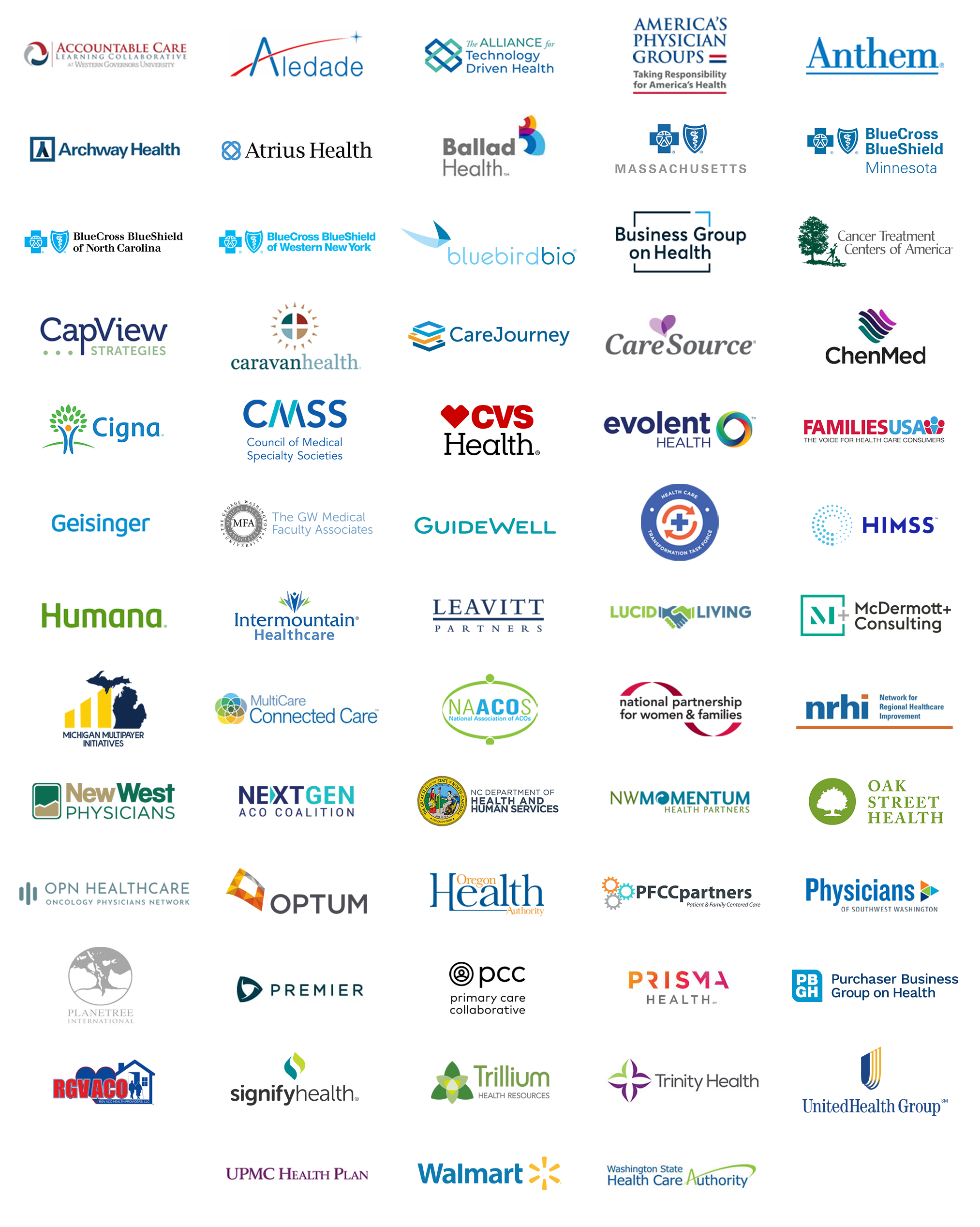2021 Q2 Newsletter | June 29, 2021

The LANs Executive Forums—the CEO Forum and the Care Transformation Forum—convene health care leaders committed to shaping the strategic direction of value-based payments in the United States. The LAN is excited to welcome CMMI Director Liz Fowler to the CEO Forum. She attended and participated in her first Executive Forum (EF) meeting in March (see Executive Forum Update), and is looking forward to working with the LAN to continue to move value-based care forward.
Elizabeth “Liz” Fowler, Ph.D., J.D., is the Deputy Administrator and Director of the Center for Medicare and Medicaid Innovation. Dr. Fowler previously served as Executive Vice President of programs at The Commonwealth Fund and Vice President for Global Health Policy at Johnson & Johnson. Liz was special assistant to President Obama on health care and economic policy at the National Economic Council. From 2008-2010, she was Chief Health Counsel to Senate Finance Committee Chair, Senator Max Baucus (D-MT), where she played a critical role developing the Senate version of the Affordable Care Act. She also played a key role drafting the 2003 Medicare Prescription Drug, Improvement, and Modernization Act (MMA). Liz has over 25 years of experience in health policy and health services research. She earned her bachelor’s degree from the University of Pennsylvania, a Ph.D. from the Johns Hopkins Bloomberg School of Public Health, where her research focused on risk adjustment, and a law degree (J.D.) from the University of Minnesota. She is admitted to the bar in Maryland, the District of Columbia, and the U.S. Supreme Court. Liz is a Fellow of the inaugural class of the Aspen Health Innovators Fellowship and a member of the Aspen Global Leadership Network.

The LAN recently launched the Health Equity Advisory Team (HEAT) to identify and prioritize opportunities to advance health equity through alternative payment models (APMs), influence design principles, and inform LAN priorities and initiatives. At the kick-off meeting, members met virtually and discussed the group’s work plan and strategy for the next few months. Two of the first objectives were establishing a working definition of health equity to guide the work of the HEAT and defining APM’s scope of influence on health equity.
The HEAT’s goal is person-centered—to leverage APMs to help make care more accessible, drive better patient outcomes, and reduce disparities. Patient experiences, priorities, and perceptions are crucial elements that the HEAT will explore.
The HEAT will identify and prioritize elements of APMs that can advance equity in the short- and long-term as well as provide input on how APMs with these elements can be successfully and intentionally implemented.
These initiatives can help make care more accessible, create flexibility for person-centered care, encourage equitable care approaches, and foster accountability for reducing disparities and driving equitable patient outcomes.

HEAT co-chairs Dr. Marshall Chin and Karen Dale will provide real-world insight to help guide the LAN towards a cohesive understanding of equitable healthcare.
As a public-private partnership, the LAN recognizes the current administration’s commitment to taking bold action to advance a comprehensive equity agenda to end disparities in healthcare access and to expand Americans’ access to quality, affordable health care. The LAN sees an opportunity to ensure that APM design and implementation intentionally address factors that drive health inequities.
The HEAT’s diverse team of regional and national implementers and health equity subject matter experts bring valuable perspectives and experience to the task of identifying and mitigating health inequities across communities and in the nation’s health care system.
Marshall Chin, MD, MPH, FACP

Dr. Marshall Chin, the Richard Parrillo Family Professor of Healthcare Ethics at the University of Chicago and a practicing general internist and health services researcher, has dedicated his career to reducing health disparities through interventions at individual, organizational, community, and policy levels. He has elucidated practical approaches to improving care of diverse individual patients and addressing systemic, structural drivers of disparities in the nation’s health care system. Through the Robert Wood Johnson Foundation’s Advancing Health Equity: Leading Care, Payment, and Systems Transformation program, Dr. Chin collaborates with teams of state Medicaid agencies, Medicaid managed care organizations, and frontline healthcare delivery organizations to implement payment reforms to support and incentivize care transformations that advance health equity. He also partners with eight urban and rural communities to integrate medical and social care to reduce diabetes disparities through the Merck Foundation’s Bridging the Gap: Reducing Disparities in Diabetes Care program.
Dr. Chin is a former President of the Society of General Internal Medicine (SGIM) and has won mentoring awards from SGIM and the University of Chicago. He was elected to the National Academy of Medicine in 2017.
Dr. Chin is a graduate of Harvard College and the University of California, San Francisco School of Medicine. He completed his residency and fellowship training in general internal medicine at Brigham and Women’s Hospital, Harvard Medical School.
“Advancing health equity is the most important priority for strengthening our nation’s health. Alternative payment models developed and implemented by multistakeholder teams have great potential to support care transformations that address the medical and social factors that drive health disparities.”
—Marshall Chin, HEAT Co-chair
Karen M. Dale, RN, MSN

Karen Dale is the Market President for AmeriHealth Caritas’ Medicaid managed care organization in Washington, D.C. In addition to her role as Market President, Dale was appointed to AmeriHealth Caritas’ newly created position of Chief Diversity, Equity, and Inclusion Officer. Having held multiple positions of leadership during the past two decades, Dale has worked with a broad group of stakeholders to address policies and other key factors impacting the delivery of health care services. In addressing the range of needs experienced by the nation’s vulnerable populations, Dale has cultivated a focus that has helped AmeriHealth Caritas continuously innovate, while meeting the highest levels of quality and service. These efforts include the use of digital tools to aid in the management of chronic diseases, peer-to-peer outreach using community health workers and peer specialists, and the use of a human-centered design member engagement approach. Dale’s vision is notably reflected in key programs addressing Black maternal health, racism, housing, transportation, violence interruption, and food insecurity. In addition, her philosophy that healthcare must evolve into a health ecosystem that promotes wellness without barriers, starting where the people are, has led to several collaborative relationships with providers, community partners, philanthropists, and businesses to implement sustainable, scalable solutions with high impact.
Ms. Dale was a member of the Leadership Greater Washington Class of 2003. She serves as a board member for both the Volunteers of America National Services and the Volunteers of America National Board, as well as the D.C. Access to Justice Commission.
Ms. Dale holds a Master of Science degree in psychiatric mental health nursing from The Catholic University and a Bachelor of Science degree in nursing from George Mason University.

The LAN’s Executive Forum recently held its quarterly meeting to discuss the LAN’s progress and future work. The agenda included a CMMI update from CMMI Director Liz Fowler, updates on the LAN’s next initiatives, and a series of breakout discussions on gaining organizational support for the organization’s work. The meeting opened with a welcome by co-chairs Marc Harrison and Mark McClellan, as well as a brief update on the Healthcare Resiliency Framework (HRF) Initiative’s progress and commitments since September.

CMMI Director, Liz Fowler, addressed the group and took questions. She emphasized that both CMS and the Administration are committed to improving access to care and prioritizing value. She remarked that the LAN could help define end goals around value-based care and champion them.
Her remarks also included the following key takeaways:
• CMMI’s commitment to value-based care has never been stronger.
• The LAN has led the way with measuring APM implementation. The APM framework provides a platform for where to go next.
• There is a need for consensus around outcomes for value-based care. CMMI is looking to boost momentum around shared goals by leveraging input from stakeholders.
• CMMI conducted a lessons-learned/strategic review to inform the future vision of healthcare transformation, and what is most apparent is that the patient must be at the center of the system.
• Health equity must be a focus in everything CMMI does.
• Partnerships with the public and private sectors will be essential to making progress.

Mark McClellan walked the group through the Health Equity Advisory Team (HEAT) launch and emphasized that the HEAT’s membership incorporates a broad range of perspectives, including community-based organizations, patient/consumer representatives, and providers serving populations that have been traditionally marginalized.
The attendees participated in several breakout groups that focused on:
• Motivating Organizational Change to Leverage APMs in Improving Health Equity
• Identifying Goals and Communicating the Value and Mission of Investing in Health Equity Initiatives
• Prioritizing Areas for Primary Care Model Design Alignment – Views through an Equity Lens
The breakouts allowed healthcare leaders in attendance to collaborate, share ideas, provide updates on what their respective organizations are doing in the value-based care and help inform the work of the HEAT.
Please stay up to date by visiting our website and following us on our social media channels – LinkedIn and Twitter!
LAN Leaders in the News
Congratulations to the following Executive Forum members for their accomplishments in the field:
• Jaewon Ryu was reappointed to the Medicare Payment Advisory Commission. Congress established MedPAC in 1997 to analyze access to care, cost and quality of care, and other key issues affecting Medicare. MedPAC advises Congress on payments to providers in Medicare’s traditional fee-for-service programs and to health plans participating in the Medicare Advantage program.
• Marc Harrison was recently recognized as one of 50 Most Influential Clinical Executives by Modern Healthcare. The 50 Most Influential Clinical Executives program honors physicians working in the healthcare industry who are deemed by their peers and an expert panel to be the most influential individuals in terms of demonstrating leadership and impact.
• Karen Lynch is making history. CVSHealth is now the highest-ranking company ever to be led by a female chief executive in the Fortune500 list’s 67-year history. Read the deeper dive into Karen’s journey!
Links to notable media resources within the last quarter.
LAN Co-Chair, Mark McClellan
READ: High-Value Comprehensive Care for Individuals, Families, and Communities: A Vision and Strategy for the Centers for Medicare and Medicaid Services in Collaboration with States, Payers, and Purchasers
“…payment reforms to date have generally had limited systemwide impacts and have been insufficient to provide broad access to high-value comprehensive care. To accelerate availability of such care, we can draw on some of the collective lessons in the past decade of health care reform…”
CMMI Director, Liz Fowler
READ: CMMI’s Fowler: More mandatory payment models likely“We need to move away from this spaghetti-against-the-wall, see-what-flowers-bloom approach and double down on what we see is working. Going forward as a general principle, I think we want to focus on our strategies aligned with the overall goal of health system transformation.”
LAN Co-Chair, Mark McClellan, and CMMI Director, Liz Fowler
WATCH: CMMI and Value-Based Care After COVID-19: New Opportunities to Address Long-Standing ChallengesDuring this webinar, Duke-Margolis Center Director and LAN CEO Forum Co-Chair Mark McClellan and CMMI Director Liz Fowler discussed a vision and strategy for how CMMI can leverage value-based payments models to support and sustain care transformation and promote health equity.
Organization: Intermountain Healthcare
LISTEN: AHA PodcastNancy Myers, American Hospital Association (AHA), Vice President of Leadership and System Innovation, talks with Mikelle Moore, Senior Vice President and Chief Community Health Officer at Salt Lake City, Utah-based Intermountain Healthcare, about community health improvement during and after the COVID-19 pandemic.
LAN Co-Chair, Mark McClellan
READ: A Decade of Value-Based Payment: Lessons Learned and Implications for the Center for Medicare and Medicaid Innovation, Part 1 and Part 2The past decade of payment reform experience has provided valuable lessons regarding the design and implementation of value-based payments. Further progress in adopting VBP models should build on these lessons learned, to best reduce costs and improve quality, outcomes, and people’s experience of care.
Our Vision
An American healthcare system that pays for value to the benefit of our patients and communities.
Our Mission
To accelerate the shift to value-based care in order to achieve better outcomes at lower cost.
Our Goal Statement
Accelerate the percentage of US healthcare payments tied to quality and value in each market segment through the adoption of two-sided risk alternative payment models.


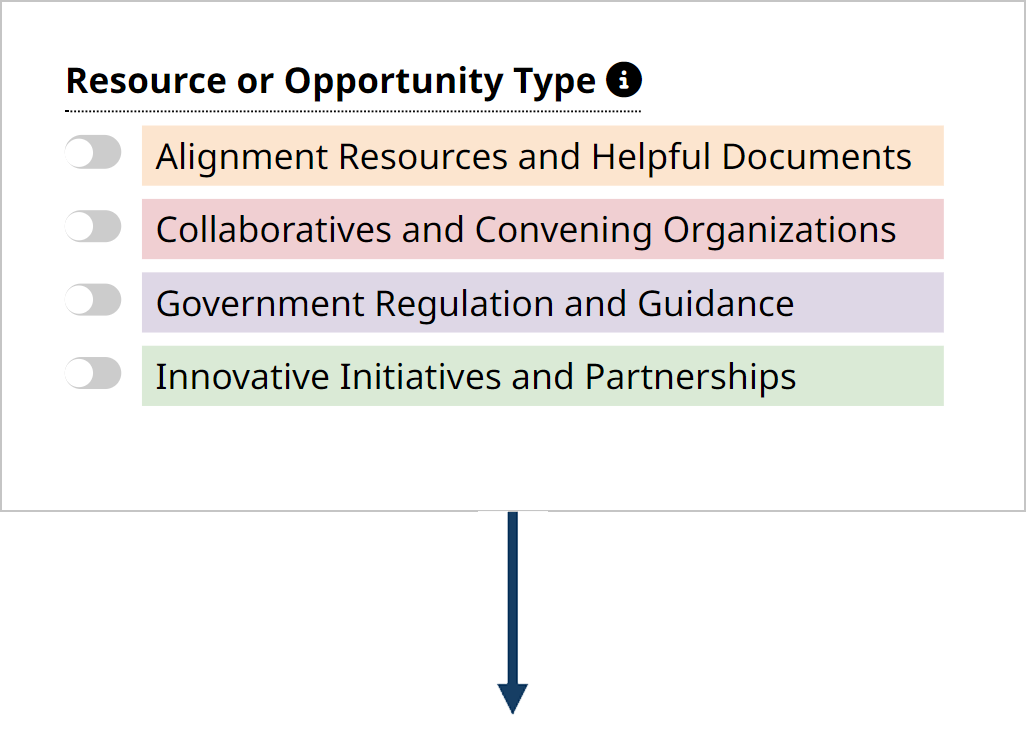
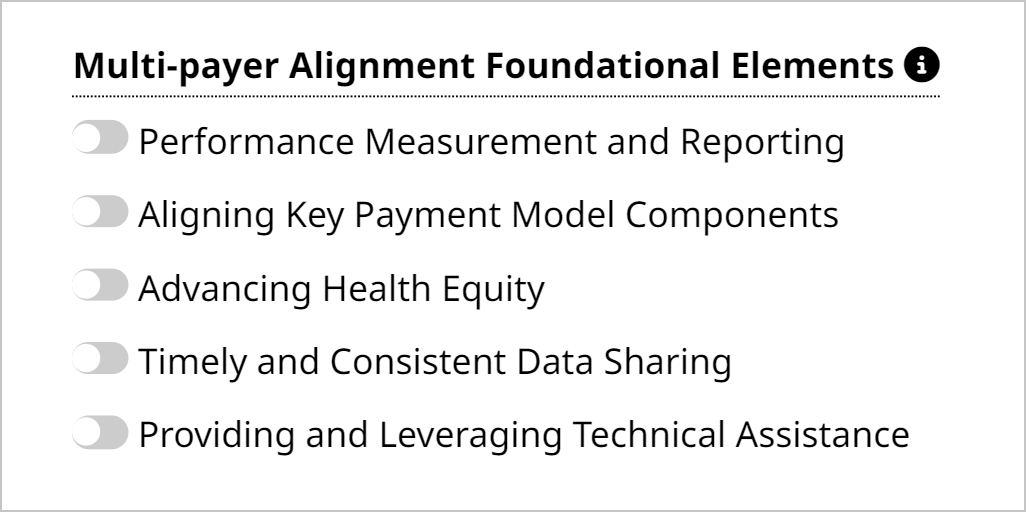
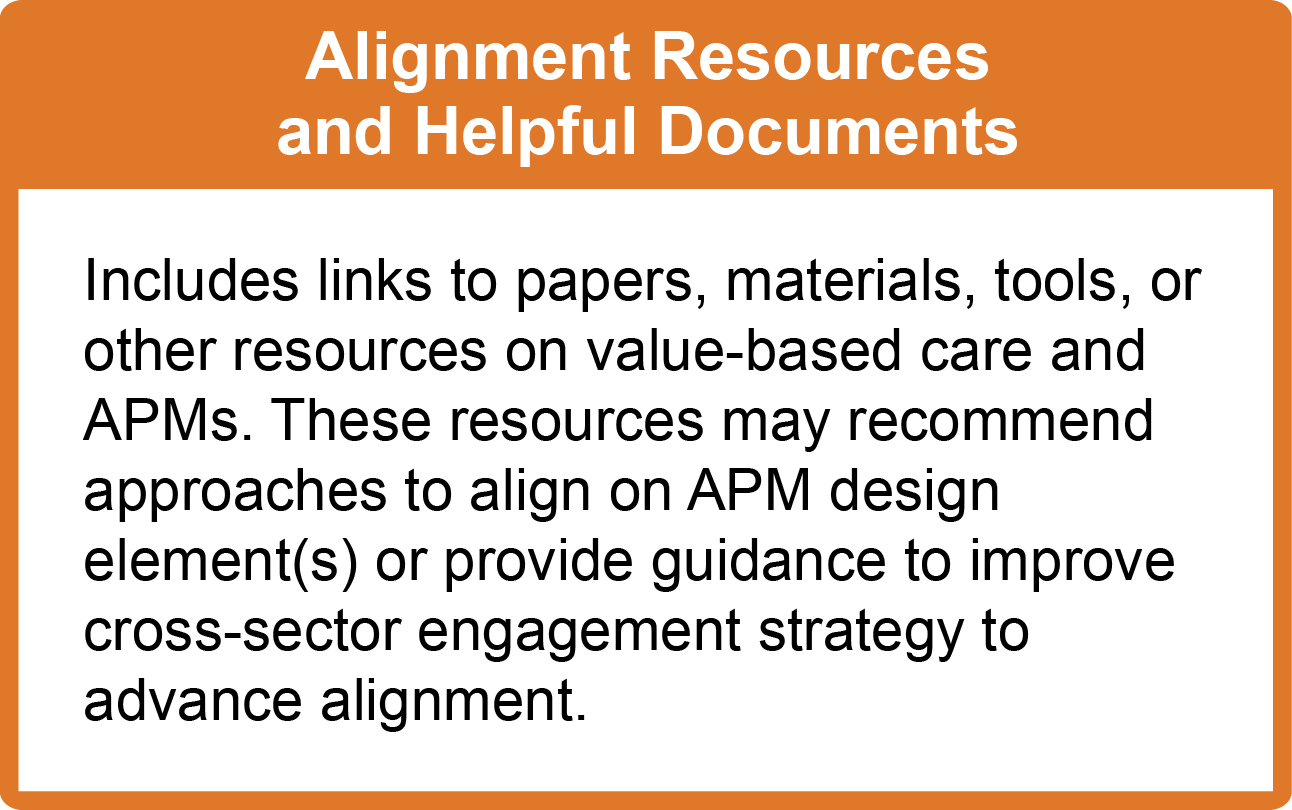
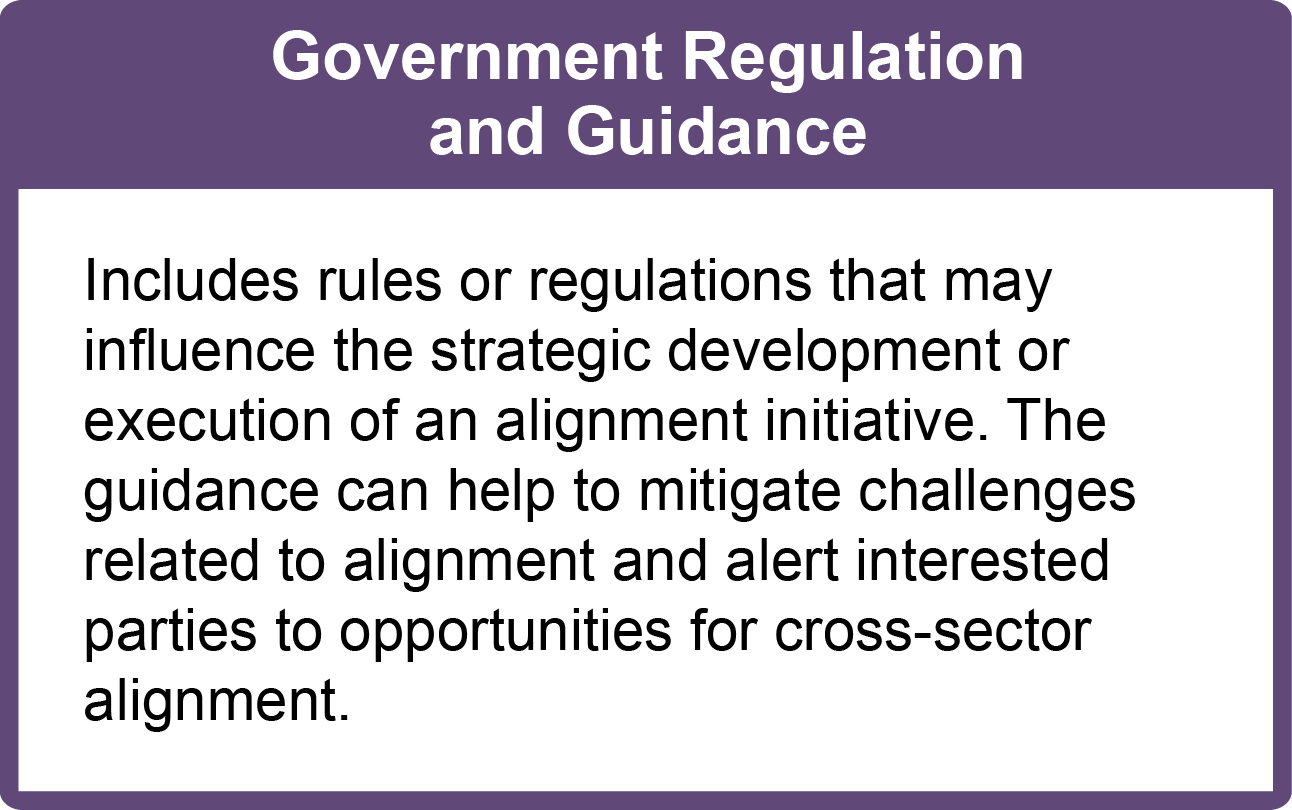
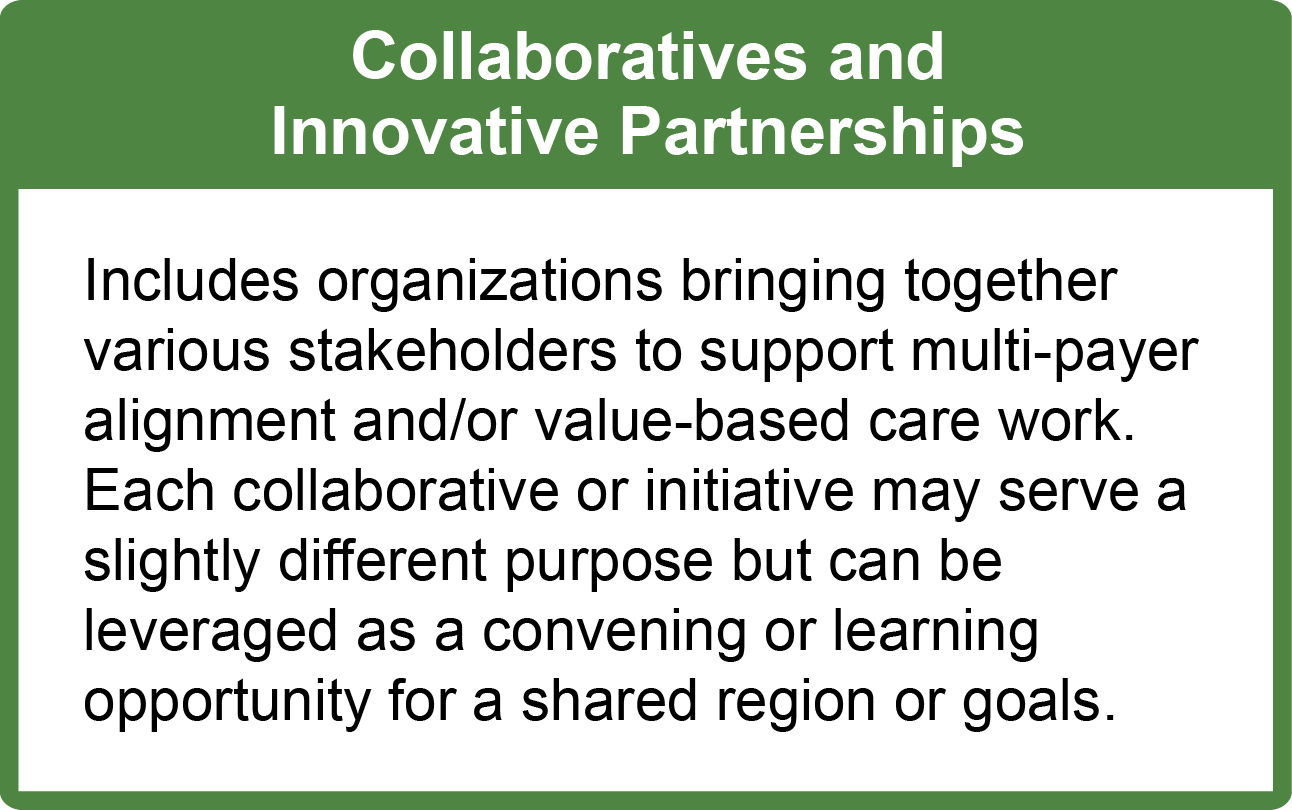


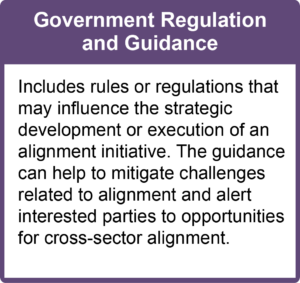



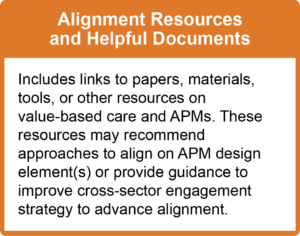
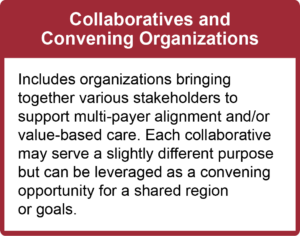
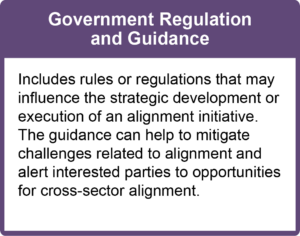
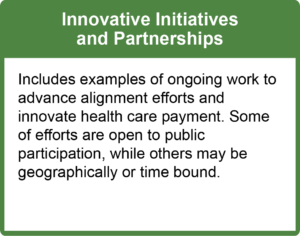

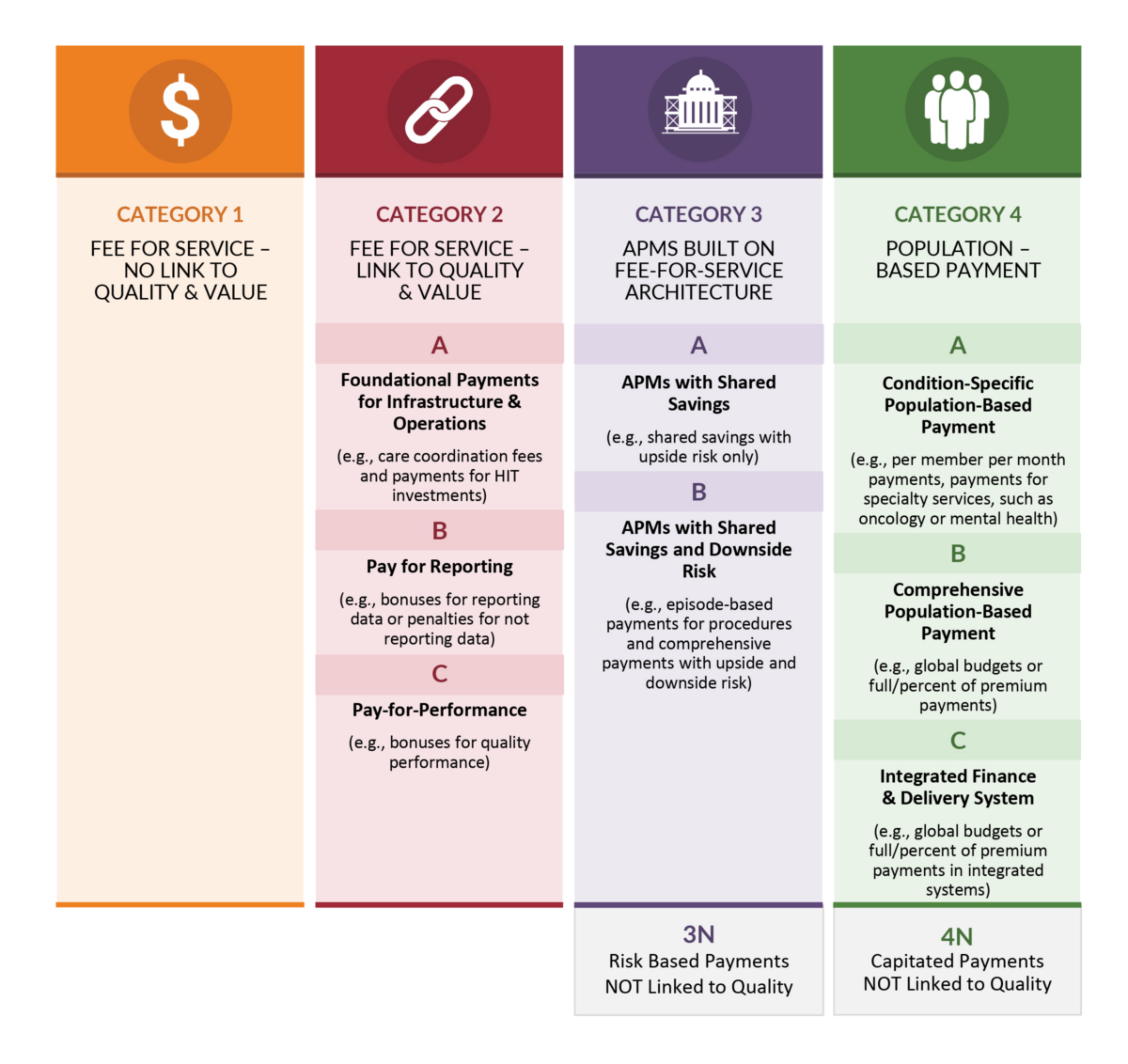
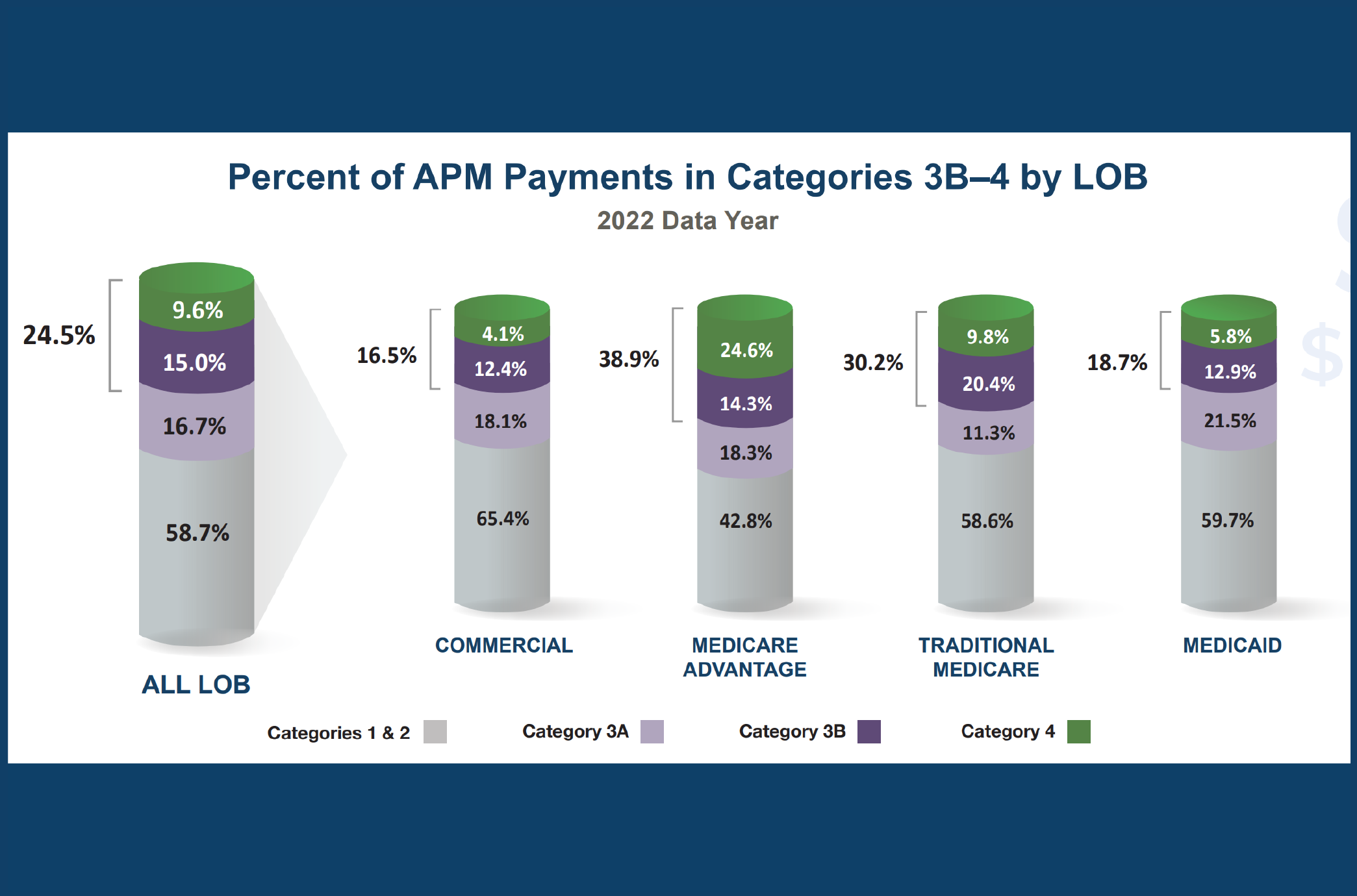
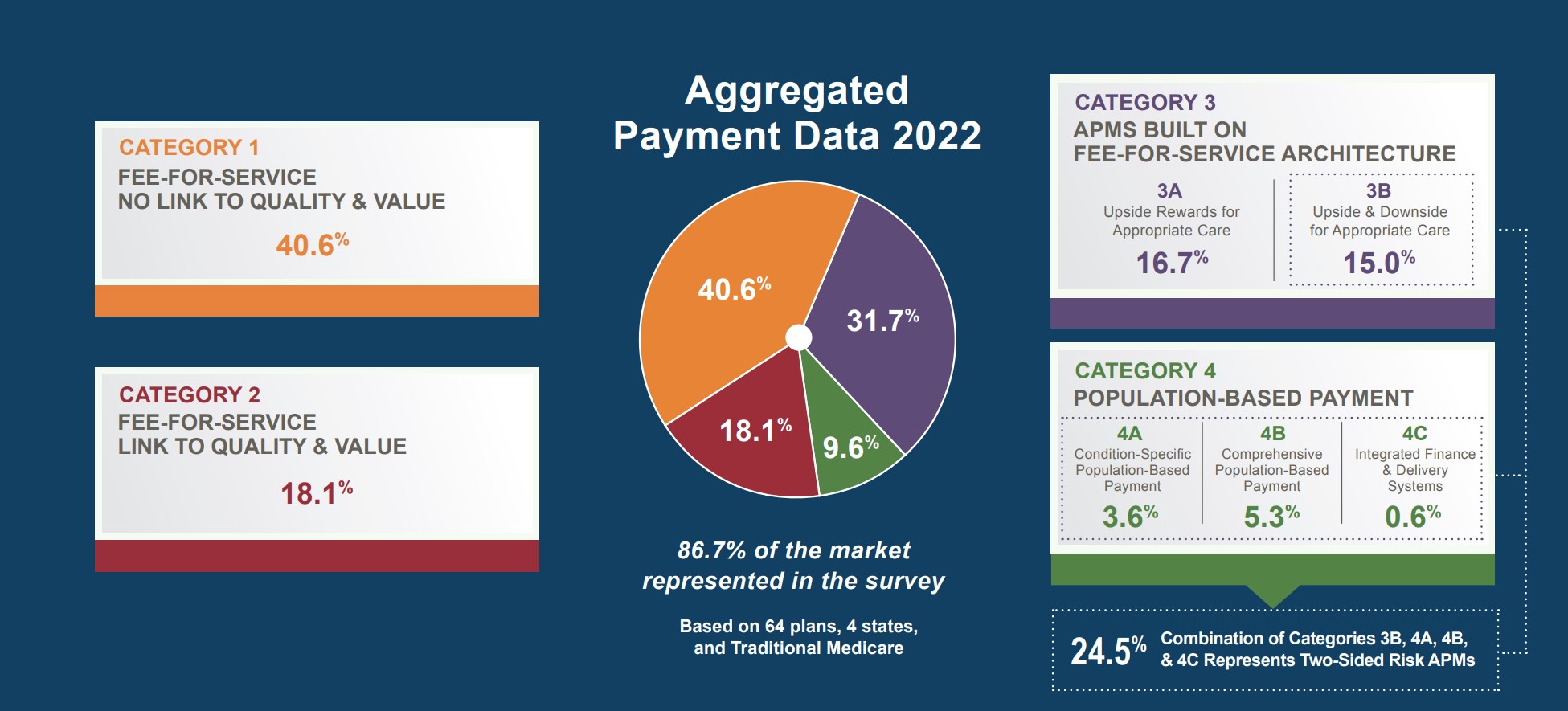
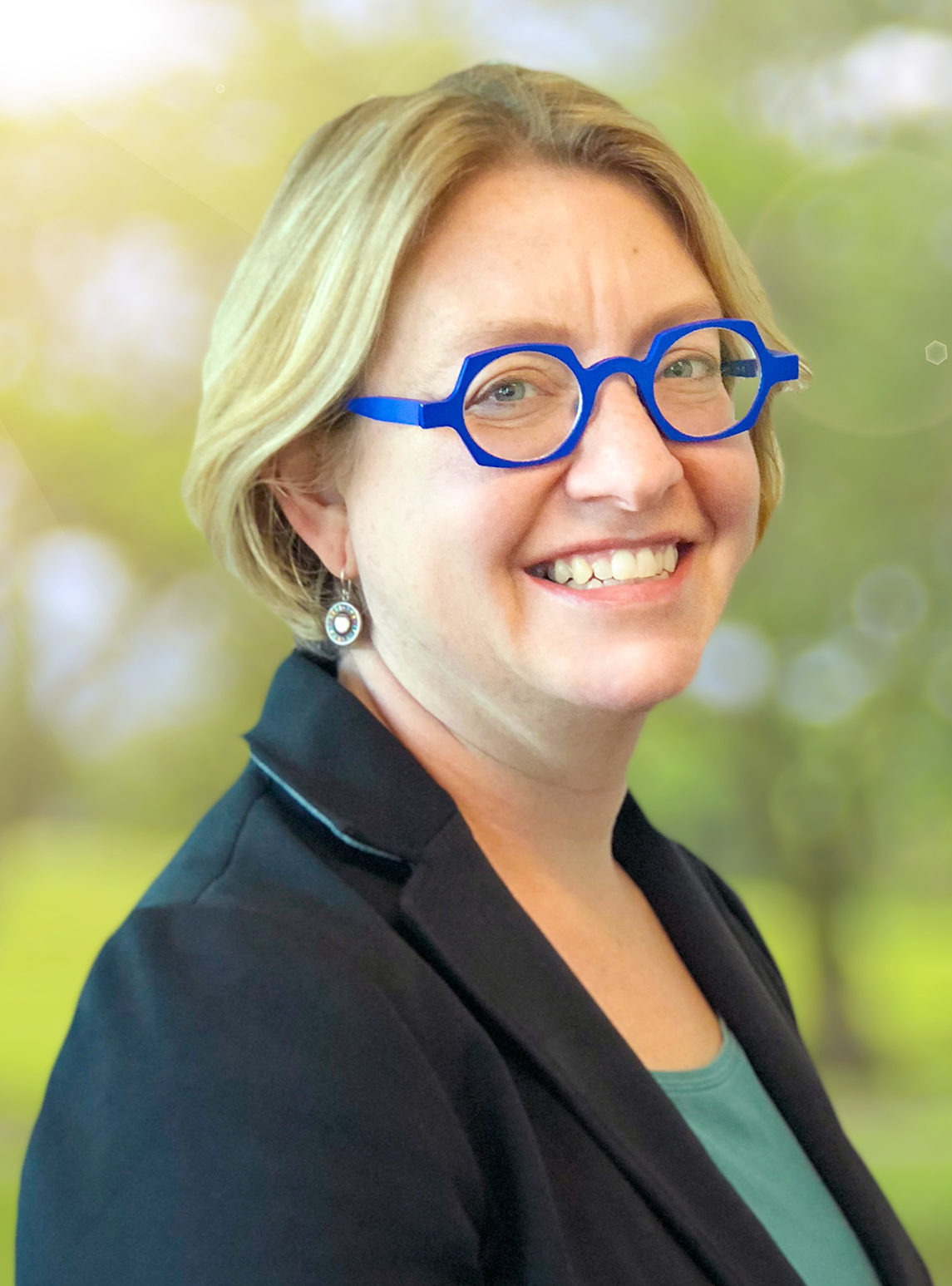
 Emily DuHamel Brower, M.B.A., is senior vice president of clinical integration and physician services for Trinity Health. Emphasizing clinical integration and payment model transformation, Ms. Brower provides strategic direction related to the evolving accountable healthcare environment with strong results. Her team is currently accountable for $10.4B of medical expense for 1.6M lives in Medicare Accountable Care Organizations (ACOs), Medicare Advantage, and Medicaid and Commercial Alternative Payment Models.
Emily DuHamel Brower, M.B.A., is senior vice president of clinical integration and physician services for Trinity Health. Emphasizing clinical integration and payment model transformation, Ms. Brower provides strategic direction related to the evolving accountable healthcare environment with strong results. Her team is currently accountable for $10.4B of medical expense for 1.6M lives in Medicare Accountable Care Organizations (ACOs), Medicare Advantage, and Medicaid and Commercial Alternative Payment Models. Mr. James Sinkoff is the Deputy Executive Officer and Chief Financial Officer for Sun River Health (formerly known as Hudson River HealthCare), and the Chief Executive Officer of Solutions 4 Community Health (S4CH); an MSO serving FQHCs and private physician practices.
Mr. James Sinkoff is the Deputy Executive Officer and Chief Financial Officer for Sun River Health (formerly known as Hudson River HealthCare), and the Chief Executive Officer of Solutions 4 Community Health (S4CH); an MSO serving FQHCs and private physician practices. Victor is the Chief Medical Officer for TennCare, Tennessee’s Medicaid Agency. At TennCare, Victor leads the medical office to ensure quality and effective delivery of medical, pharmacy, and dental services to its members. He also leads TennCare’s opioid epidemic strategy, social determinants of health, and practice transformation initiatives across the agency. Prior to joining TennCare, Victor worked at Evolent Health supporting value-based population health care delivery. In 2013, Victor served as a White House Fellow to the Secretary of Health and Human Services. Victor completed his Internal Medicine Residency at Emory University still practices clinically as an internist in the Veteran’s Affairs Health System.
Victor is the Chief Medical Officer for TennCare, Tennessee’s Medicaid Agency. At TennCare, Victor leads the medical office to ensure quality and effective delivery of medical, pharmacy, and dental services to its members. He also leads TennCare’s opioid epidemic strategy, social determinants of health, and practice transformation initiatives across the agency. Prior to joining TennCare, Victor worked at Evolent Health supporting value-based population health care delivery. In 2013, Victor served as a White House Fellow to the Secretary of Health and Human Services. Victor completed his Internal Medicine Residency at Emory University still practices clinically as an internist in the Veteran’s Affairs Health System. Dr. Brandon G. Wilson, DrPH, MHA (he, him, his) joined Community Catalyst as the Director of the Center for Consumer Engagement in Health Innovation, where he leads the Center in bringing the community’s experience to the forefront of health systems transformation and health reform efforts, in order to deliver better care, better value and better health for every community, particularly vulnerable and historically underserved populations. The Center works directly with community advocates around the country to increase the skills and power they have to establish an effective voice at all levels of the health care system. The Center collaborates with innovative health plans, hospitals and providers to incorporate communities and their lived experience into the design of systems of care. The Center also works with state and federal policymakers to spur change that makes the health system more responsive to communities. And it provides consulting services to health plans, provider groups and other health care organizations to help them create meaningful structures for engagement with their communities.
Dr. Brandon G. Wilson, DrPH, MHA (he, him, his) joined Community Catalyst as the Director of the Center for Consumer Engagement in Health Innovation, where he leads the Center in bringing the community’s experience to the forefront of health systems transformation and health reform efforts, in order to deliver better care, better value and better health for every community, particularly vulnerable and historically underserved populations. The Center works directly with community advocates around the country to increase the skills and power they have to establish an effective voice at all levels of the health care system. The Center collaborates with innovative health plans, hospitals and providers to incorporate communities and their lived experience into the design of systems of care. The Center also works with state and federal policymakers to spur change that makes the health system more responsive to communities. And it provides consulting services to health plans, provider groups and other health care organizations to help them create meaningful structures for engagement with their communities.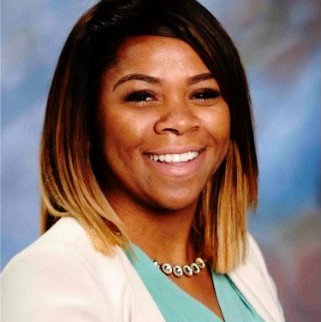 Tamara Ward is the SVP of Insurance Business Operations at Oscar Health, where she leads the National Network Contracting Strategy and Market Expansion & Readiness. Prior to Oscar she served as VP of Managed Care & Network Operations at TriHealth in Southwest Ohio. With over 15 years of progressive health care experience, she has been instrumental driving collaborative payer provider strategies, improving insurance operations, and building high value networks through her various roles with UHC and other large provider health systems. Her breadth and depth of experience and interest-based approach has allowed her to have success solving some of the most complex issues our industry faces today. Tam is passionate about driving change for marginalized communities, developing Oscar’s Culturally Competent Care Program- reducing healthcare disparities and improving access for the underserved population. Tamara holds a B.A. from the University of Cincinnati’s and M.B.A from Miami University.
Tamara Ward is the SVP of Insurance Business Operations at Oscar Health, where she leads the National Network Contracting Strategy and Market Expansion & Readiness. Prior to Oscar she served as VP of Managed Care & Network Operations at TriHealth in Southwest Ohio. With over 15 years of progressive health care experience, she has been instrumental driving collaborative payer provider strategies, improving insurance operations, and building high value networks through her various roles with UHC and other large provider health systems. Her breadth and depth of experience and interest-based approach has allowed her to have success solving some of the most complex issues our industry faces today. Tam is passionate about driving change for marginalized communities, developing Oscar’s Culturally Competent Care Program- reducing healthcare disparities and improving access for the underserved population. Tamara holds a B.A. from the University of Cincinnati’s and M.B.A from Miami University.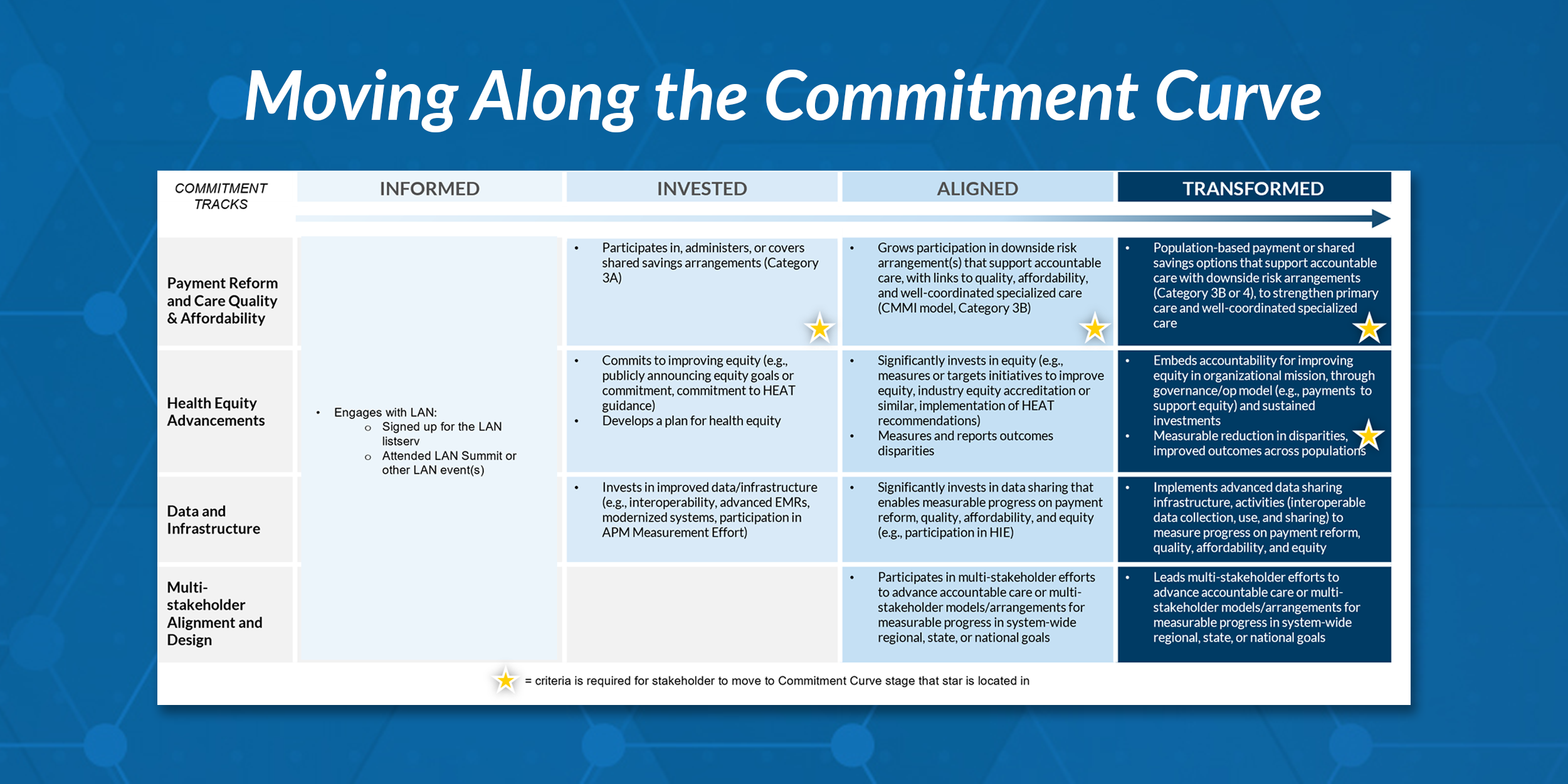
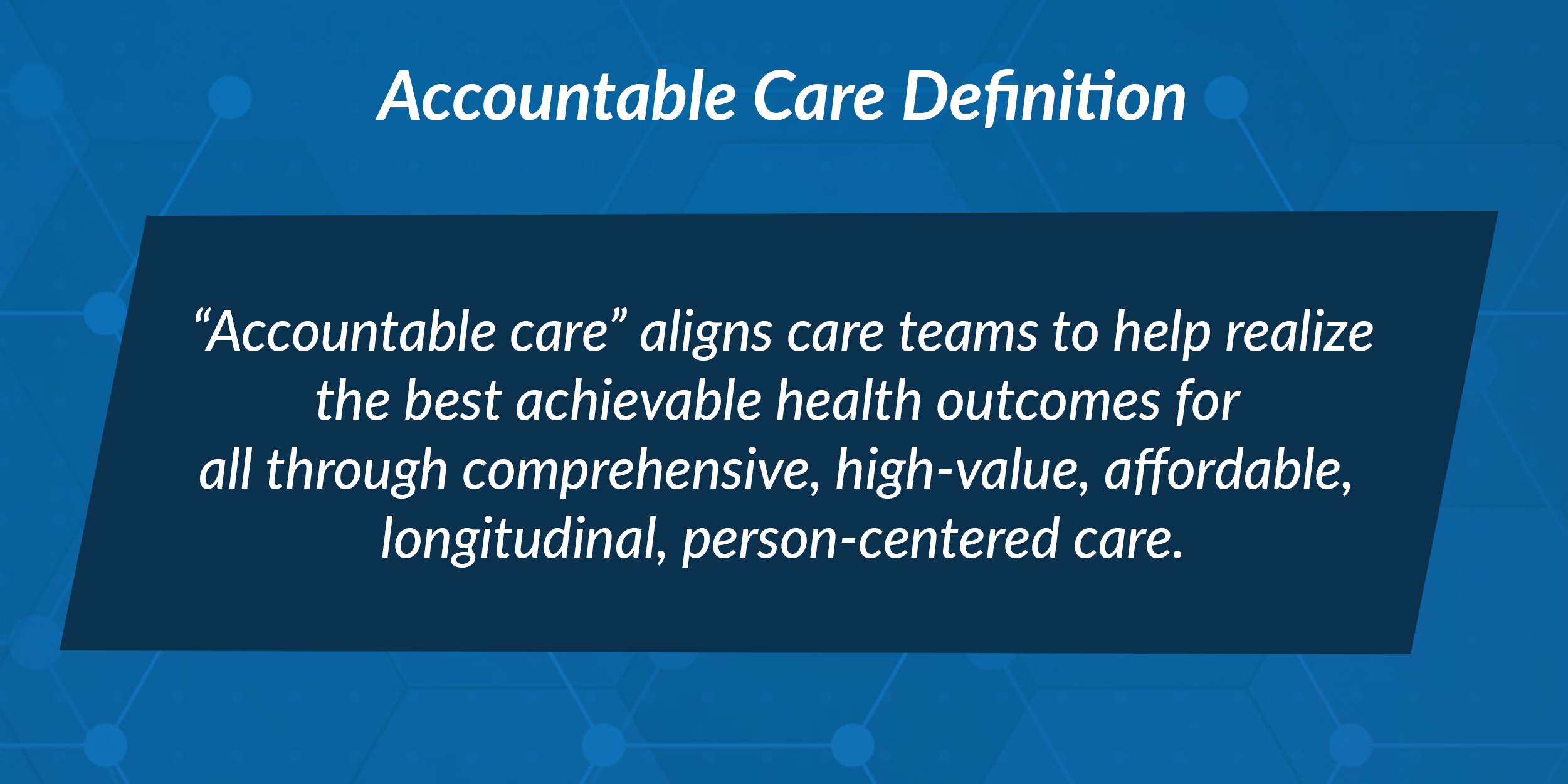
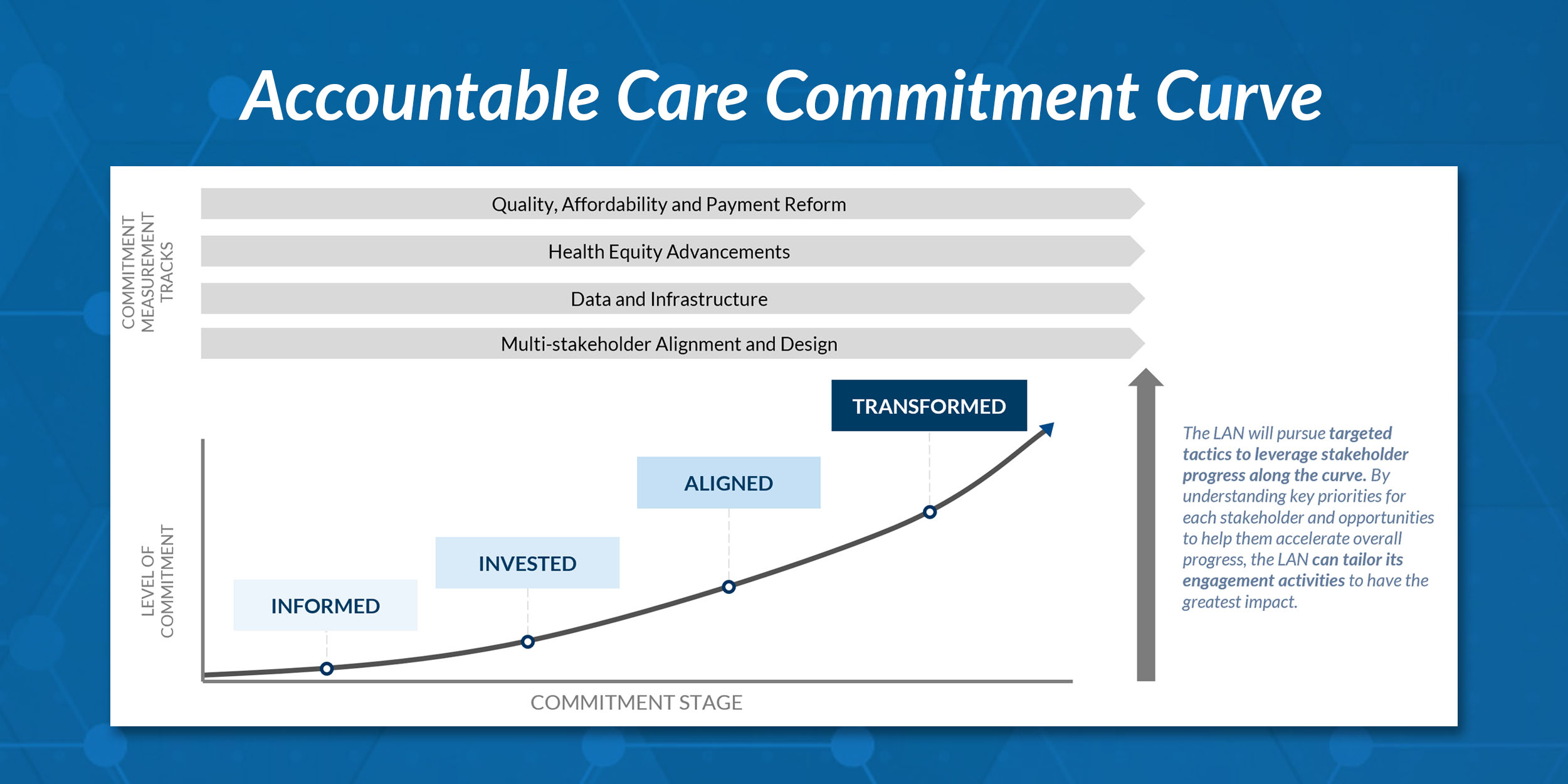
 Dr. Peter Walsh joined the Colorado Department of Health Care Policy and Financing as the Chief Medical Officer on December 1, 2020. Prior to joining HCPF, Dr. Walsh served as a Hospital Field Representative/Surveyor at the Joint Commission, headquartered in Oakbrook Terrace, Illinois.
Dr. Peter Walsh joined the Colorado Department of Health Care Policy and Financing as the Chief Medical Officer on December 1, 2020. Prior to joining HCPF, Dr. Walsh served as a Hospital Field Representative/Surveyor at the Joint Commission, headquartered in Oakbrook Terrace, Illinois.





